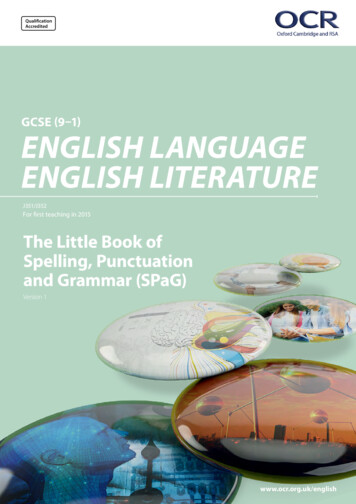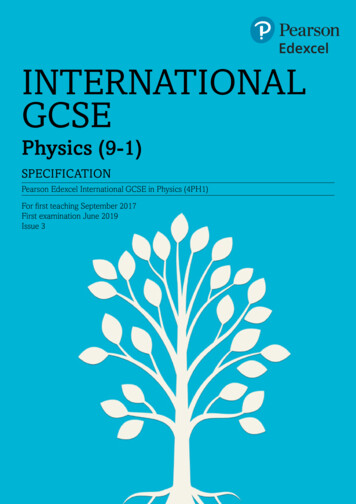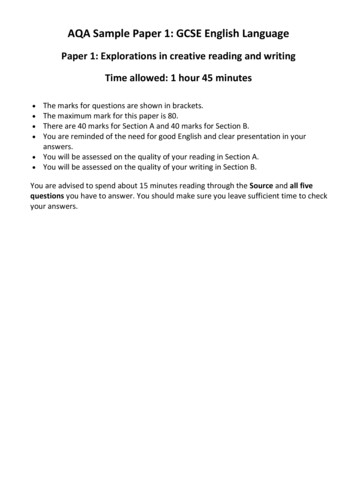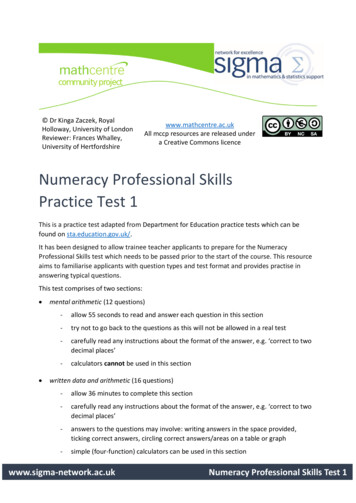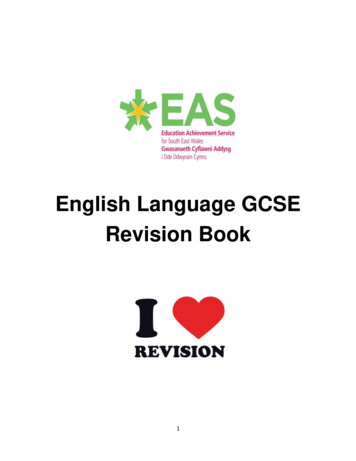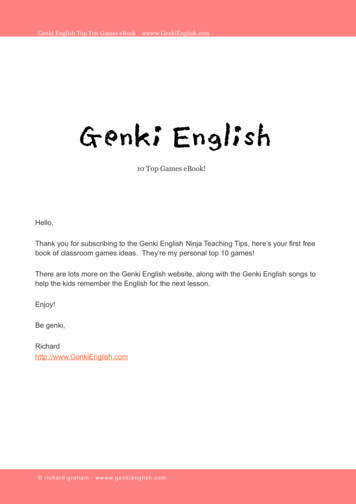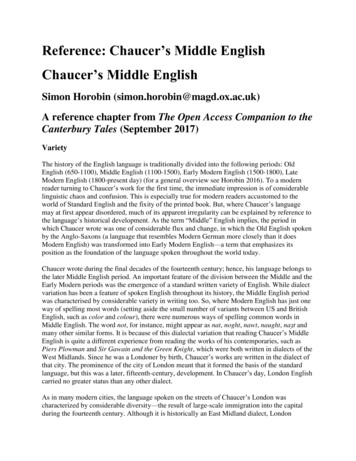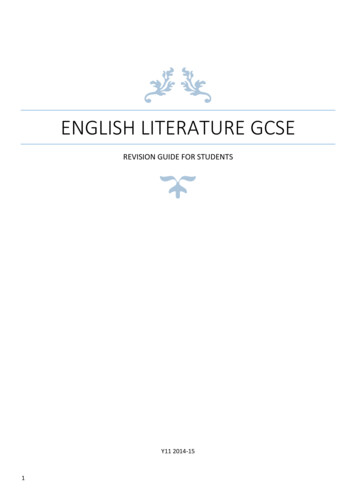
Transcription
ENGLISH LITERATURE GCSEREVISION GUIDE FOR STUDENTSY11 2014-151
ContentsEnglish Literature: Lord of the Flies by William Golding . 5Key Terms/ Words. 5What makes a C?. 5Key Quotations: Chapter by Chapter . 5Chapter 1:. 5Chapter 2:. 5Chapter 3:. 6Chapter 4:. 6Chapter 5:. 6Chapter 6:. 6Chapter 7:. 6Chapter 8:. 6Chapter 9:. 7Chapter 10:. 7Chapter 11:. 7Chapter 12:. 8Background information . 8Character Profiles. 9Piggy . 9Ralph . 9Jack . 9Roger . 10Simon . 10Maurice . 10Sam. 10Eric. 10Key Themes . 10Sin and Human Brutality . 11What makes a B or above? . 12Symbolism . 12The conch . 12Rationality . 12Its destruction . 12Rescue sign . 13Cooking . 13Safety vs destruction . 13The ‘beastie’ . 142Origins . 14Back to Contents
Realisation . 14Piggy’s Glasses. 14The Lord of the Flies . 14The Influence of the Coral Island . 15Ideal vs real . 15Similar characters. 15Evil intentions. 15Microcosm of the adult world . 15The Significance of the Title . 16Exam Top Tips For Success . 17Past Questions: Lord of the Flies Essay Questions . 17English Literature: Of Mice and Men by John Steinbeck (1937) . 19Analysis . 19Title . 21Symbolism . 21Key themes: Dreams (The American Dream); loneliness; authority and responsibility; violence. 21Dreams . 21Loneliness. 22Authority and responsibility. 22Violence. 23Key characters: revise these in terms of their power ranking. . 23Context . 23How to get a B ?----- . 24How to get an A ?----- . 24Sample questions . 24English Literature: The Woman in Black . 27Betrayal . 28Isolation. 28Revenge. 29Fear . 29The Supernatural. 30Madness . 30Arthur Kipps . 31Samuel Daily. 31Keckwick. 31The Landlord . 32Mr Jerome . 32The Woman in Black . 32Alice Drablow . 323Back to Contents
Stella. 32Esme and her Family . 33Spider . 33Eel Marsh House . 33Key words/Ideas. 33Past Exam Questions . 344Back to Contents
English Literature:Lord of the Flies by William GoldingEnglish Literature Revision Guide(20% of English Literature GCSE)Key Terms/ WordsFearHuman rimitiveOrderKnowledgeInnateEvilWhat makes a C?Knowing key quotations, key character traits and key themesKey Quotations: Chapter by ChapterChapter 1:"They used to call me Piggy!""The creature was a party of boys, marching.""You're no good on a job like this."Chapter 2:"Ralph sat on a fallen trunk, his left side to the sun. On his right were most of the choir; on his left the largerboys who had not known each other before.before him small children squatted in the grass.""'We've got to have rules and obey them. After all, we're not savages. We're English, and the English arebest at everything.'""You got your small fire all right."5
Chapter 3:"Then, amid the roar of bees in the afternoon sunlight, Simon found for the fruit they could not reach.passed them back down to the endless, outstretched hands.""The candle-buds opened their wide white flowers. Their scent spilled out into the air and took possessionof the island."Chapter 4:"Here, invisible yet strong, was the taboo of the old life.""He began to dance and his laughter became a bloodthirsty snarling.""I painted my face--I stole up. Now you eat--all of you--and I--"Chapter 5:"Piggy, for all his ludicrous body, had brains. Ralph was a specialist in thought now, and could recognizethought in another.""Serve you right if something did get you, you useless lot of cry-babies!""Daddy said they haven't found all the animals in the sea yet.""Maybe there is a beast.maybe it's only us.'""The world, that understandable and lawful world, was slipping away."Chapter 6:"Even the sounds of nightmare from the other shelters no longer reached him, for he was back to wherecame from, feeding the ponies with sugar over the garden wall."Chapter 7:"You'll get back to where you came from.'""'Kill the pig! Cut his throat! Kill the pig! Bash him in!'""The desire to squeeze and hurt was over-mastering.""We mustn't let anything happen to Piggy, must we?""The only trouble was that he would never be a very good chess player."Chapter 8:"He says things like Piggy. He isn't a proper chief.'""Piggy was. so full of pride in his contribution to the good of society, that he helped to fetch wood."6Back to Contents
"This head is for the beast. It's a gift.""You knew, didn't you? I'm part of you? Close, close, close! I'm the reason why it's no go? Why things arewhat they are?""You're not wanted."Chapter 9:"'Kill the beast! Cut his throat! Spill his blood!'""They were glad to touch the brown backs of the fence that hemmed in the terror and made itgovernable.""There were no words, and no movements but the tearing of teeth and claws.""The water rose farther and dressed Simon's coarse hair with brightness. The line of his cheek silvered andthe turn of his shoulder became sculptured marble.""Surrounded by a fringe of inquisitive bright creatures, itself a silver shape beneath the steadfastconstellations, Simon's dead body moved out toward the open sea."Chapter 10:"We was on the outside. We never done nothing, we never seen nothing.""You can't tell what he might do.""There were no words, and no movements but the tearing of teeth and claws.""What could be safer than the bus centre with its lamps and wheels?""'It's come. It's real!'"Chapter 11:"This is jus’ talk. I want my glasses.""After all we aren't savages really.""A single drop of water that had escaped Piggy's fingers now flashed on the delicate curve like a star.""Behind them on the grass the headless and paunched body of a sow lay where they had dropped it.""Ralph--remember what we came for. The fire. My specs.""Samneric protested out of the heart of civilization""You're a beast and a swine and a bloody, bloody thief!""Which is better--to have laws and agree, or to hunt and kill?"7Back to Contents
"The rock struck Piggy a glancing blow from chin to knee; the conch exploded into a thousand whitefragments and ceased to exist.”Chapter 12:"'They're not as bad as that. It was an accident.'""Then there was that indefinable connection between himself and Jack; who therefore would never let himalone.""A star appeared. and was momentarily eclipsed by some movement.""Ralph launched himself like a cat; stabbed, snarling, with the spear, and the savage doubled up.""What was the sensible thing to do? There was no Piggy to talk sense.""Couldn't a fire outrun a galloping horse?""You'll get back.""He saw a shelter burst into flames and the fire flapped at his right shoulder.""In the stern-sheets another rating held a sub-machine gun.""'I should have thought that a pack of British boys. would have been able to put up a better show thanthat.'""Ralph wept for the end of innocence, the darkness of man's heart, and the fall through the air of the true,wise friend called Piggy."Background information From 1939 during the Second World War, Golding served in the Royal Navy in command of a rocketship. He was involved in the bombardment and sinking of enemy ships, the Battle of the NorthAtlantic and the Normandy Landings. The character of the naval officer in the final moments of thenovel may have been a persona he was familiar with. During his wartime service he witnessed andcontributed to vast destruction and human suffering.8 The end of the Second World War left his pessimistic and bitter about the future of mankind andour capacity for humanity or ‘civilisation’: he felt despair at the ‘discovery’ of the concentrationcamps as well as the use of the atomic bomb as a way of bringing about an end to the conflict. Thewar led him to believe in the innate evil of humanity. We are trapped by original sin. The novel is set during a time of global conflict. His original draft of the novel, rejected by hispublisher, included an opening chapter that looked at a nuclear war which caused the boys’evacuation from England and their crash. This fictional background may also explain Piggy’spessimism that they will be rescued by adults who are busy destroying each other, and hisinsistence that they are now responsible for and accountable to themselves.Back to Contents
Golding worked as a teacher in a boy’s private school. From this experience he felt he gained insightinto human behaviour and human potential – or lack of.Character ProfilesPiggyPigs are intelligent creatures that are hunted and killed on the islandThis parallels the events surrounding Piggy. rational and intelligent, overweight and physically unfitwears thick glassesgets out of breath easily because he has asthmapoor grammar suggests that he comes from a different social background than Ralphthinks logically and has a scientific way of looking at the worldan outsiderapprehensive of anything involving physical activitysevere physical limitationsRalphRalph’s name is derived from the Anglo-Saxon language meaning ‘counsel’ well built, athleticdisplays leadership skills immediatelyeager to be rescued and believes desperately that adults will come to their rescueneeds to be alone to think things outresponsible and can organisetolerant and open-mindedpossesses moral couragealthough he admits to fear, he does not lack couragepopular and admiredbelieves in rules and fair playJackJack’s name is Hebrew in origin and means ‘one who supplants’ 9leader of the choir and later the hunterscharismatic, attractive and manipulativeirritable and quick to angerhas no time for weaknessdestructive naturewants to make up his own rules and is power hungryhas primitive urges and feelingsis happy and at home in the forestno qualities such as thought and reasoningrules his tribe by fear and violenceused to powersuperficial maturityaggressive with violent reactionsBack to Contents
self-confident and arrogant irresponsibleRogerHis name, which is Germanic in origin, means ‘spear’ furtive, intense, secretivedesire to hurt otherssadistic and irresponsibleruthless and coldly violentenjoys the freedom of being out of controlSimonSimon’s name comes from the Hebrew word meaning ‘listener’ has fits and is ridiculedsolitary and stammershas insight and is thoughtful about the situationhas the faith that everything will be all rightrepresents the spiritual, poetic point of viewcompassionatehis oddness is the mark of an individualMaurice enthusiastic and easily swayed joins in with Jack’s gang and doesn’t consider the consequences the jokerSam Eric’s twin brother, younger than the others has dominant control over Eric and is the more dominant of the pairEric Sam’s twin brother, appears much younger than the rest follows his brother and accepts his choicesKey Themes The need for civilisation/The Basic needs of society Innocence and the loss of it Fear of the unknown Blindness and Sight Use and Abuse of Power10Back to Contents
The Loss of Identity The Problem of Evil in Man Betrayal Survival Bullying Justice and Injustice Violence and Death LeadershipSin and Human Brutality Human beings are innately evil; we all have the capacity to commit evil and are born with this trait.All we need is a catalyst to allow this brutality to be revealed and acted upon. The boys of the novel,trapped on an island, are representative of humanity. They are a microcosm of our doomed and selfdestructive nature. By reverting back to barbarism and barbarity they reflect the fall of man. Golding takes advantage of this oxymoron: children are traditionally seen as innocent and pure,untainted yet by the world and by temptation, so Golding his using the shock value of brutal childrento make the reader question their implicit values and assumptions. Interestingly, Golding was frustrated by children’s stories that he himself read to his children. Storiessuch as the Famous Five show children working as civilised creatures in harmony, moral awarenessand unity to defeat evil. Golding felt that this was ridiculous.11Back to Contents
What makes a B or above?Knowing key literary techniques: HOW the novel is writtenSymbolismThe conchRationality The conch is symbolic of common sense and discipline. It is beautiful because it is part of theisland. "In colour the shell was deep cream, touched here and there with fading pink."Its beauty strikes us when Ralph and Piggy find it, but then is forgotten as they put it to use.Piggy treats the conch with great care.In his world of reason, the symbol of the conch is central to a civilised society.The conch gives authority to a speaker and through the conch the needs of the boys can bediscussed in an orderly way.The boys cannot talk at meetings unless they are holding the conch, and, for Piggy, the conchavows the necessity of decent, controlled behaviour.It is Piggy who immediately recognises the shell as a conch and he instructs Ralph how to blow it,in order to call meetings.Its destruction 12If its destruction at the same time as Piggy's death symbolises the destruction of rationality onthe island, it also points out the limitations of that rationality.Throughout the novel Piggy cradles the conch, desperate to cling to a world that is sensible andrational.However, as the situation on the island deteriorates, and Jack's brutality is entrenched, theconch becomes irrelevant and pointless.The conch belongs to nature and as soon as man begins to use it, with whatever decentintentions, it is doomed to inadequacy and oblivion.It brings into being assemblies that rapidly disintegrate into horseplay and boredom.Once Jack is chief, his initial disregard for the conch becomes absolute, as Jack's society is asociety of tyranny and violence.The end of the conch, when it shatters with Piggy, comes about because of eyes that can nolonger see shining thing or boy, but only empty shell and pig, which stand in the way and fuel thepower urge.The conch shatters with the same force as Roger destroys Piggy: "the conch exploded into athousand white fragments and ceased to exist."Back to Contents
Rescue signAfter his initial exploration of the island, Ralph calls a second meeting, and discusses the necessity ofmaking a fire so that they can be rescued. This sounds like fun to the boys, and all of them, except Piggy,rush off to build one. The fire rages out of control and "The boys broke into shrill, excited cheering"and"build a bonfire".Piggy is frustrated and screams at them to "act proper". He is indignant and furious that the boys havegone "and set the whole island on fire". The necessity of a fire as a smoke signal is lost on the boys.Cooking For Jack, the fire is for roasting pig, despite his initial boast that he and his hunters will keep arescue fire going. When a ship does pass on the horizon, the fire is dead, as Jack and his huntersare so intoxicated with the hunt that they have forgotten about rescue.Jack is angered when Ralph and Piggy attack him about the dead fire. Jack lunges at Piggy andbreaks one side of his glasses. The fire is re-lit for the purpose of cooking the pig and the boysfeast on meat.Later in the novel, when Ralph and Piggy go to Castle Rock to recover Piggy's glasses that Jack andhis hunters have stolen, the fire now has one purpose only - cooking pig. Ralph screams at Jack:"Look at that! Call that a signal fire? That's a cooking fire. Now you'll eat and there'll be no smoke.Don't you understand?" Of course Jack and his hunters have no wish to understand, as the idea ofrescue belongs to a world long forgotten. Thus at the end of the novel, in order to hunt and killRalph, Jack recklessly sets the entire island on fire.Safety vs destruction 13If the fire is first a rational but false symbol of safety, and then an irrational but true symbol ofdestruction, then it exactly parallels the symbolic use of the hunters who offer first a hope ofsustenance and then a foreshadowing of disaster in their concern with killing rather than cooking.It is indeed ironic that Piggy's spectacles, emblem of a "civilised" intelligence, should be linked tothe fire that comes, as much as the beast, to stand for that primitivism and savagery so rampantby the end of the novel. The more sinister associations of the fire are fostered by Jack's assertionthat the conch, the would-be symbol of order, does not "count" on the mountain, the location ofthe fire.Back to Contents
The ‘beastie’Origins The term includes all the fear and terrors of the boys. It is a terrifying force that Golding believesis in all of us - a force of evil. As the rules of society lose the fragile grip on people, the concept ofthe beast becomes increasingly more desperate and more terrifying. This leads to the boys'hysterical "The beast comes out of the sea -" / "Out of the dark -" / "Trees -".The beastie is introduced by the boy with the mulberry-coloured birthmark. The small boy seemsto have mistaken the large tree-creepers for snakes. The "littluns" become more and morefrightened by the darkness and have nightmares about the "beastie".One of the most pathetic aspects of the reality of the boys as frightened and confusedhumankind is their insistence on seeking the beast everywhere but in the place of its origin, thehuman heart. Adults can comfort children after nightmares but in a situation where no adultsare present and where the nightmares are made to indicate the terrible limitations of adultknowledge, no such comfort can emerge.For Jack, the beast is something that can be controlled. Hence he offers the head of a pig as asacrifice, as a gift for the beast. Furthermore, Jack's frenzied hunting and the ritual chantingenable the boys to forget the beast temporarily.Realisatio
5 English Literature: Lord of the Flies by William Golding English Literature Revisio
